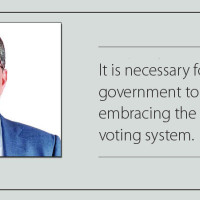- Wednesday, 11 February 2026
PM Oli’s China Visit
Focus On Implementing Past Accords
Prime Minister KP Sharma Oli, scheduled to visit China in the first week of December, is likely to emphasise implementing various past agreements reached between Nepal and China. During Prime Minister Oli's previous trips, Nepal and China inked a number of agreements aimed at accelerating Nepal's economic growth and improving Nepal-China ties. The past accords centred on trade and commerce, infrastructure, and connectivity. Nepal's reliance on Indian ports was reduced by the Trade and Transit Agreement, which permitted Nepal to trade through Chinese ports.
Nepal and China signed the Belt and Road Initiative (BRI), which would build numerous infrastructure projects in Nepal to improve connectivity between the two nations. Nepal and China agreed on energy cooperation to strengthen collaboration in the energy sector, including the establishment of hydropower projects, while many infrastructure development agreements focused around the construction of roads, bridges, and railroads. The two countries signed Memorandums of Understanding (MoU) to strengthen cooperation in human resource development. However, the implementation of these accords has been extremely slow, and the PM's upcoming visit will focus on getting these agreements implemented with Chinese support.
Financial aid
During Chinese President Xi Jinping's visit to Nepal in 2019, China pledged nearly $500 million in financial aid. This included a 3.5 billion RMB (approximately $500 million) grant for the years 2020-2022. This assistance was aimed at supporting various development projects and strengthening bilateral ties between the two countries. However, some of the projects under this aid has progressed while many are still in limbo. Despite signing multiple agreements, Nepal expressed reluctance to commit to agreements for ambitious projects under BRI and bilateral frameworks owing to the financial burden they would place on the country's resources.
Prior to his visit, Prime Minister Oli met with leaders of largest coalition party, the Nepali Congress (NC), to discuss BRI agreements which will feature during his China visit. According to reports, the NC leaders spoke out against signing BRI agreements under Chinese loans. During the meeting, the ruling coalition partners, the NC and the CPN-UML, agreed that the Nepali side should not sign a new deal to finance infrastructure using BRI loans with high interest rates. This decision stems from Nepal's precarious financial status. For example, the Pokhara International Airport, which was built with a loan from China, has not generated enough revenue, causing Nepal to seek that the loan be converted into a grant.
Similarly, the feasibility assessment for the Kathmandu-Kerung Railway and the upgrade of the Kathmandu Valley's ring road is still incomplete, indicating Nepal's concerns about China's earlier obligations. Nepal inked the BRI framework with China in 2017, but progress in BRI implementation has been slow. The main reasons for the delay are differences over funding mechanisms and Nepal's reluctance to take loans due to concerns about much-hyped debt trap. However, attempts are likely to be made to get major projects forward during the visit. Projects including as the Kathmandu-Kerung Railway, the Tokha-Chhahare Tunnel, the Rasuwagadhi Highway, and Arniko Highway renovations are set to take centre stage in the bilateral dialogues. Oli's government has favoured grant-funded projects over loans, hence reducing debt concerns.
Another key aspect of the upcoming visit is PM Oli's decision to visit China first, breaking with a decades-long practice of going to India soon after taking office, has geopolitical ramifications. India is likely to interpret Oli's choice to visit China first as a diplomatic snub. PM Oli, it was reported, waited for India’s official invitation but the latter was not forthcoming in sending the invite, compelling the PM to priortise the China visit.
In the meantime, many of Oli's supporters believe his emphasis on completing previous agreements with China, such as the trade and transit pact, demonstrates his desire to minimise Nepal's development reliance on India. Nepal's ties with India deteriorated following the southern neighbour's embargo enforced shortly after the nation suffered a massive earthquake in 2015. Following the blockade, Nepal's then-Prime Minister Oli visited China and inked various agreements to reduce the country's reliance on India for commerce and transportation. People commended PM Oli for his efforts and stance against the Indian embargo.
Nepal usually strives to strike a balance in its foreign policy between its two major neighbours. To preserve such a balance, PM Oli would most likely travel to India on an official visit after returning from China, since India, Nepal's largest economic partner and a key development aid donor, wields tremendous power in Kathmandu. As China has emerged as an important strategic partner, particularly in infrastructure and connectivity, its growing presence in Nepal has alarmed India. To pile pressure on Nepal to keep China at bay, India recently stated it would not accept items manufactured in Nepal with Chinese investment. For Nepal, this necessitates a careful balance between India and China.
Geopolitical concerns
Despite geopolitical concerns, Oli's planned visit to China marks a watershed moment that will help strengthen bilateral ties with China and procure the assistance of larger neighbour in Nepal's development efforts. Nepal may make tremendous gains in infrastructure and connectivity by taking important projects forward with Chinese support and promoting bilateral collaboration, which appears to be PM Oli's primary focus during the visit.
Finally, the success of Oli's China visit will be determined not only by the signing of some fresh agreements with the northern neighbour, but also by his ability to persuade Chinese counterparts to implement previous agreements that are critical to Nepal's economic well-being and that helps Nepal in meeting its infrastructure and connectivity targets. As the two nations seek to strengthen their alliance during his visit, PM Oli's diplomatic endeavours demonstrate Nepal's commitment to remain engaged with its closest neighbours, whose economic and military heft is felt throughout the world.
(Upadhyay is a former managing editor of this daily.)
















